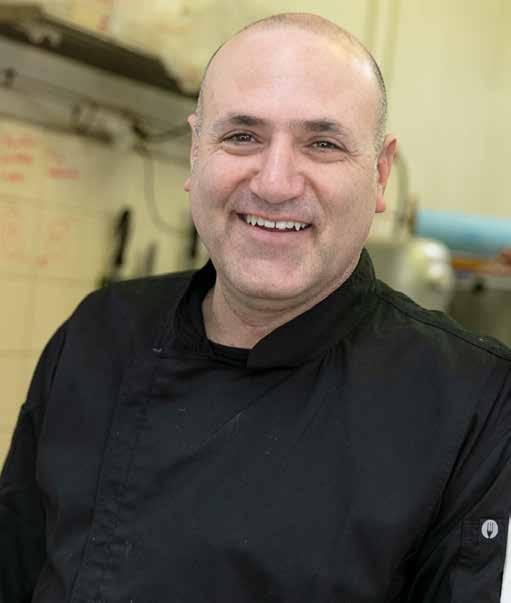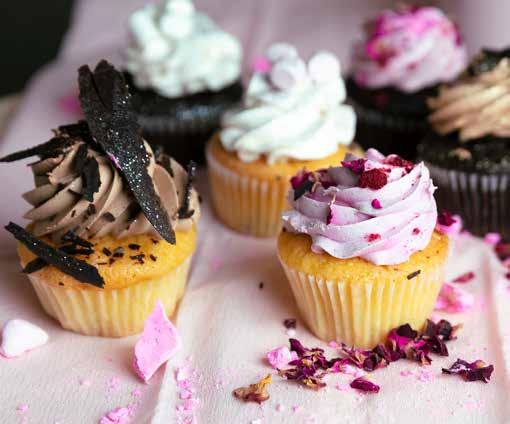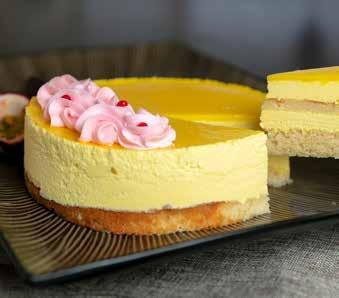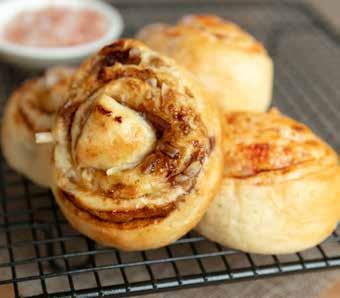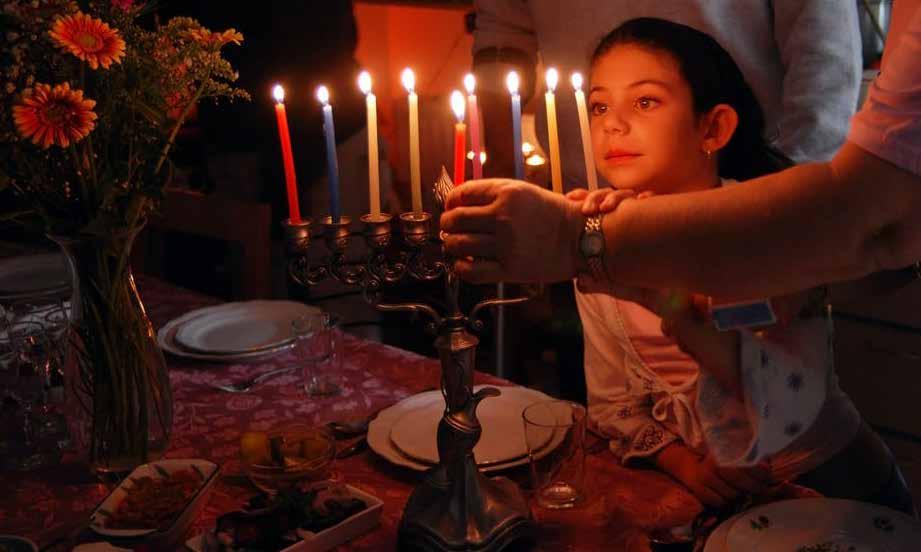
7 minute read
CHANUKAH’S TRUE MEANING
Chanukah’s true meaning is about Jewish survival
ALAN AVERY-PECK COURTESY: THE CONVERSATION
Every December Jews celebrate the eight-day festival of Chanukah, perhaps the best-known and certainly the most visible Jewish holiday.
While critics sometimes identify Christmas as promoting the prevalence in America today of what one might refer to as Chanukah kitsch, this assessment misses the social and theological significance of Chanukah within Judaism itself. Let’s consider the origin and development of Chanukah over the past more than 2,000 years.
Early history
Though it is 2,200 years old, Chanukah is one of Judaism’s newest holidays, an annual Jewish celebration that does not even appear in the Hebrew Bible.
The historical event that is the basis for Chanukah is told, rather, in the postbiblical Books of the Maccabees, which appear in the Catholic biblical canon but are not even considered part of the Bible by Jews and most Protestant denominations.
Based on the Greco-Roman model of celebrating a military triumph, Chanukah was instituted in 164 B.C. to celebrate the victory of the Maccabees, a ragtag army of Jews, against the much more powerful army of King Antiochus IV of Syria.
In 168 B.C., Antiochus outlawed Jewish practice and forced Jews to adopt pagan rituals and assimilate into Greek culture.
The Maccabees revolted against this persecution. They captured Jerusalem from Antiochus’s control, removed from the Jerusalem Temple symbols of pagan worship that Antiochus had introduced and restarted the sacrificial worship, ordained by God in the Hebrew Bible, that Antiochus had violated.
Chanukah, meaning “dedication,” marked this military victory with a celebration that lasted eight days and was modeled on the festival of Tabernacles (Sukkot) that had been banned by Antiochus.
How Chanukah evolved
The military triumph, however, was short-lived. The Maccabees’ descendants – the Hasmonean dynasty – routinely violated their own Jewish law and tradition.
Even more significantly, the following centuries witnessed the devastation that would be caused when Jews tried again to accomplish what the Maccabees had done. By now, Rome controlled the land of Israel. In A.D. 68-70 and again in A.D. 133-135, the Jews mounted passionate revolts to rid their land of this foreign and oppressing power.
The first of these revolts ended in the destruction of the Second Jerusalem Temple, the preeminent center of Jewish worship, which had stood for 600 years. As a result of the second revolt, the Jewish homeland was devastated and countless Jews were put to death.
War no longer seemed an effective solution to the Jews’ tribulations on the stage of history.
In response, a new ideology deemphasized the idea that Jews should or could change their destiny through military action. What was required, rabbis asserted, was not battle but perfect observance of God’s moral and ritual law. This would lead to God’s intervention in history to restore the Jewish people’s control over their own land and destiny.
In this context, rabbis rethought Chanukah’s origins as the celebration of a military victory. Instead, they said, Chanukah should be seen as commemorating a miracle that occurred during the Maccabees’ rededication of the temple: The story now told was how a jar of temple oil sufficient for only one day had sustained the temple’s eternal lamp for a full eight days, until additional ritually appropriate oil could be produced.
The earliest version of this story appears in the Talmud, in a document completed in the sixth century A.D. From that period on, rather than directly commemorating the Maccabees’ victory, Chanukah celebrated God’s miracle.
This is symbolized by the kindling of an eight-branched candelabra (“Menorah” or “Hanukkiah”), with one candle lit on the holiday’s first night and an additional candle added each night until, on the final night of the festival, all eight branches are lit. The ninth candle in the Hanukkiah is used to light the others.
Throughout the medieval period, however, Chanukah remained a minor Jewish festival.
What Chanukah means today
How then to understand what happened to Chanukah in the past hundred years, during which it has achieved prominence in Jewish life, both in America and around the world?
Chanukah today responds to Jews’ desire to see their history as consequential. Pixabay.com/en, CC BY
The point is that even as the holiday’s prior iterations reflected the distinctive needs of successive ages, so Jews today have reinterpreted Chanukah in light of contemporary circumstances – a point that is detailed in religion scholar Dianne Ashton’s book, “Chanukah in America.”
Ashton demonstrates while Chanukah has evolved in tandem with the extravagance of the American Christmas season, there is much more to this story.
Chanukah today responds to Jews’ desire to see their history as consequential, as reflecting the value of religious freedom that Jews share with all other Americans. Chanukah, with its bright decorations, songs, and family- and community-focused celebrations, also fulfills American Jews’ need to reengage disaffected Jews and to keep Jewish children excited about Judaism.
Poignantly, telling a story of persecution and then redemption, Chanukah today provides a historical paradigm that can help modern Jews think about the Holocaust and the emergence of Zionism.
In short, Chanukah is as powerful a commemoration as it is today because it responds to a host of factors pertinent to contemporary Jewish history and life.
Over two millennia, Chanukah has evolved to narrate the story of the Maccabees in ways that meet the distinctive needs of successive generations of Jews. Each generation tells the story as it needs to hear it, in response to the eternal values of Judaism but also as is appropriate to each period’s distinctive cultural forces, ideologies and experiences.
The author of this article is Professor in Judaic Studies at the College of the Holy Cross in Massachusetts.
4me gluten free – the place to be
CHANUKAH TREATS
If you haven’t been there yet, Chanukah is the perfect time to head to a very special bakery at 439A Kooyong Rd, Elsternwick.
For others, 4me gluten free is already an understandable favourite.
Owner Yinon emigrated to Australia with his young family in 2012.
He began baking in his own kitchen and with family and friends regularly commenting on how delicious the fruits of his labours tasted, it was only a matter of time before he let fellow Aussies in on his “secret” recipes.
After all, he has more than two decades’ experience in the field.
Yinon was aware only limited gluten free options were available and decided to try selling his products to local shops and delicatessens.
Then the time came to move out of the family kitchen and that is how 4me gluten free came to be.
Earlier this year, importantly, the business was accredited by Coeliac Australia. It is also kosher certified by Kosher Australia.
Yinon’s vision has always been to provide premium taste with his gluten free, nut free and dairy free products.
“As the saying goes, variety is the spice of life. We have healthier, great tasting, high quality cakes and desserts for all. I am always exploring new combinations.
“I do not want to differentiate between those who may have food intolerances and those that don’t,” Yinon said.
Among 4me gluten free’s offerings are cinnamon scrolls, croissants, chocolate croissants and bee sting cakes, which quickly became “crowd favourites”.
Most recently, it has introduced Alfajores cookies. Originating from Spain and South America, they are meltin-your-mouth shortbreads, filled with caramel and coconut.
Let’s not forget the Madeleine dessert, a traditional French sweet.
And what would Chanukah be without Super Doughnut Day on 28th November?
Fancies include doughnuts filled with jam, chocolate and vanilla custard, cookies and cream, and cinnamon, or you could try a Simpsons’ doughnut.
Add to that the two new flavours – caramel and the super chocolate glazed with marshmallows and dried raspberries. Yum! 4me gluten free is also planning to expand its vegan, low FODMAP and sugar-free range.
Those with an appetite for the savoury are also catered for, with a range of artisan breads, focaccias and samosas, along with pizza and vegemite scrolls.
To avoid disappointment, it is best to order online via www.4meglutenfree. com.au/order or phone Yinon on 0401 835 656 or his wife, Sharon, on 0413 487 709.
To find out more about 4me gluten free, go to www.4meglutenfree.com.au
